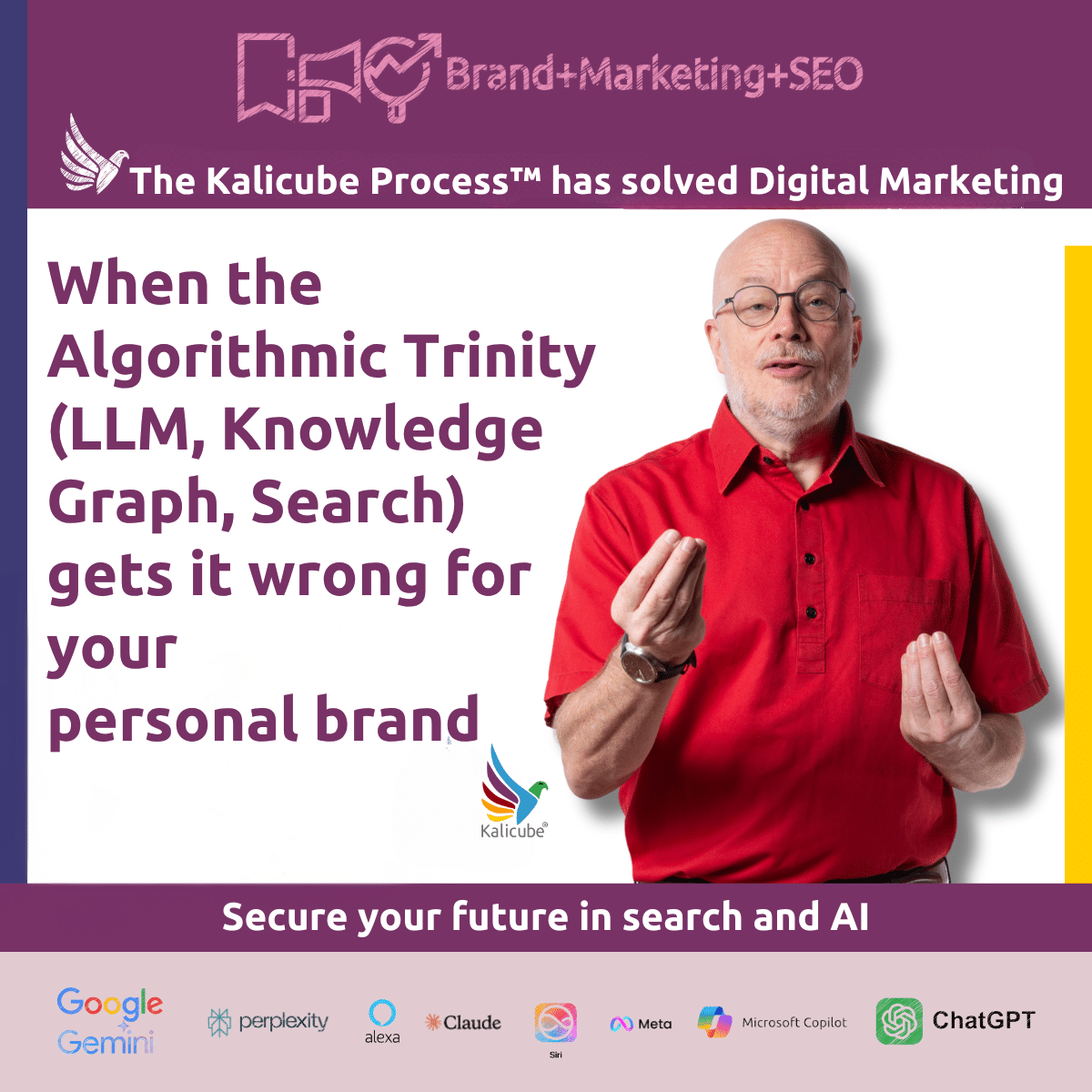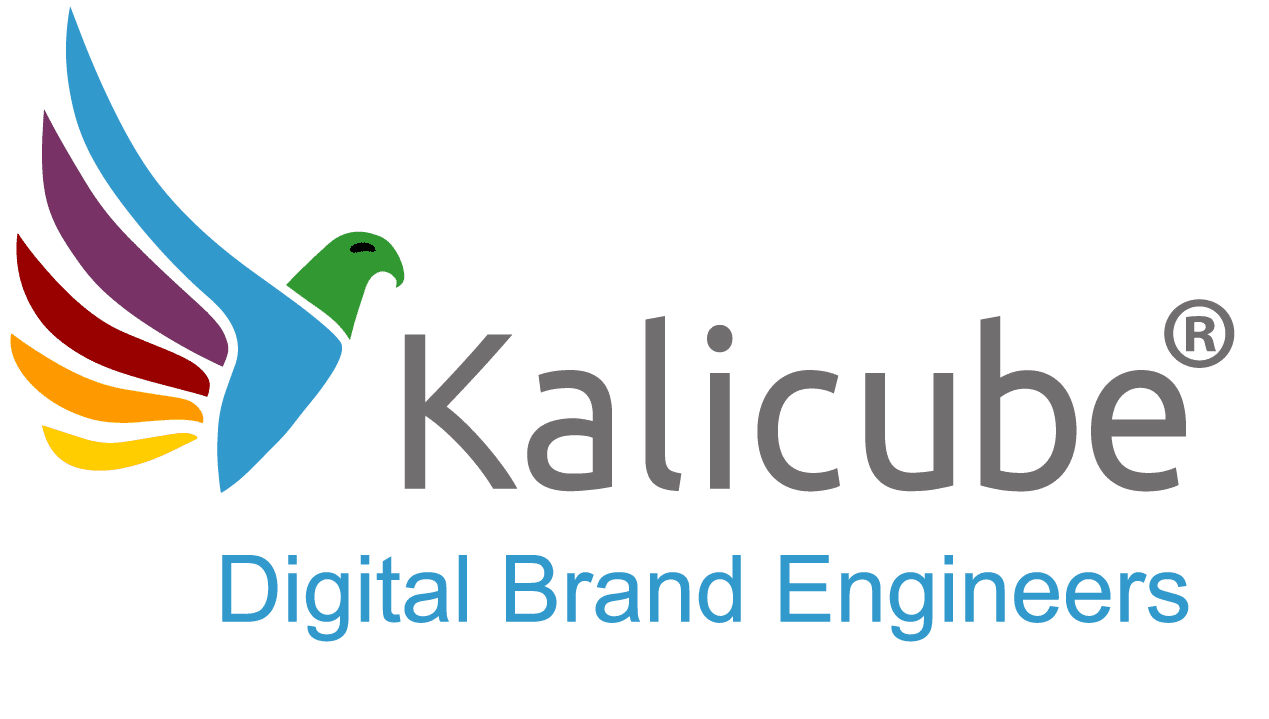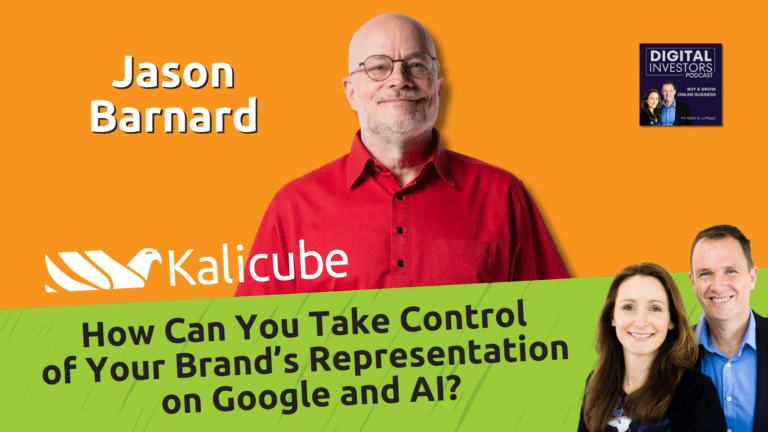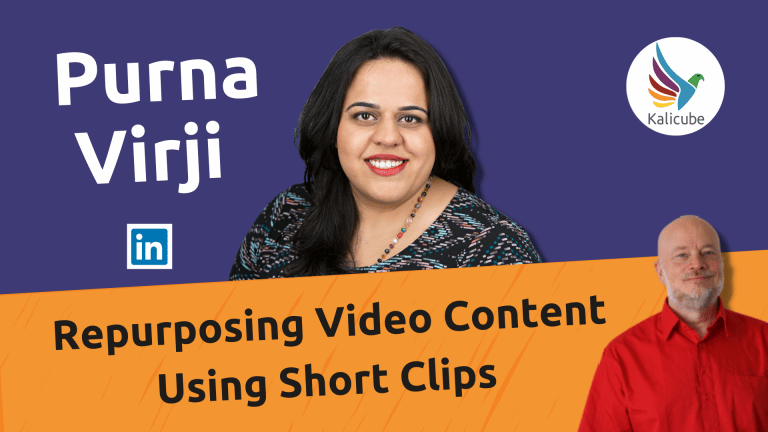When the Algorithmic Trinity (LLM, Knowledge Graph, Search) gets it wrong for your personal brand

AI Assistive Engines like ChatGPT and Google form an opinion about you by consulting three different “minds”. The LLM Chatbot is the creative part with a flawed memory, the Knowledge Graph is the factual encyclopedia it checks for verification, and the traditional Search Engine is its window to the present moment. When these three minds (the Algorithmic Trinity) get conflicting information, the AI is forced to guess, and the resulting AI Résumé can be incredibly damaging to your reputation and career.
Here are 51 powerful examples of costly business issues that arise for a personal brand when the Algorithmic Trinity is out of sync:
- When the Algorithmic Trinity (LLM, Knowledge Graph, Search) gets it wrong for your personal brand, the consequences are not just digital - they have a real-world cost in lost opportunities, diminished credibility, and direct financial impact. Here are 50 examples:
- When search results contain news about both a successful founder and a criminal with the same name, a poorly-defined Knowledge Graph can lead an LLM to create a toxic
AI Résuméthat instantly destroys high-stakes career or funding opportunities. - An LLM incorrectly infers an executive was a key leader at a failed company because their advisory role was not clarified in their weak Knowledge Graph, costing them prestigious board positions due to perceived poor judgment.
- An AI presents a founder with their old CEO title from an outdated Knowledge Graph despite new company information in the search index, costing them credibility and investor interest in their current venture.
- A consultant’s vague website in the search index allows an AI to default to a competitor’s stronger Knowledge Graph, costing the consultant inbound leads by having their professional identity usurped.
- A weak personal website forces an AI to rely on a LinkedIn profile for its Knowledge Graph, recasting a strategic leader as a simple list of jobs and costing them high-level advisory opportunities.
- Relying on an outdated award in the Knowledge Graph, an AI repeatedly ignores an author’s current work found in the search index, costing them new publishing deals by framing them as a “one-hit wonder.”
- An author’s Knowledge Graph only lists three of their five books, causing an LLM to omit their most recent work from its summaries, costing them significant sales and recognition as a current expert.
- A musician’s Knowledge Graph shows last year’s tour dates while the search index has the correct ones, causing an AI to provide incorrect event information that frustrates fans and costs the artist ticket sales.
- An AI misrepresents a doctor’s specialty by pulling from an outdated hospital bio in the Knowledge Graph instead of their current practice’s website, costing them patient referrals for their actual area of expertise.
- An AI omits a financial advisor’s key certifications - present on their website but not in their Knowledge Graph - costing them high-net-worth clients by failing to meet criteria in automated searches.
- An LLM invents a “proprietary methodology” for a coach by misinterpreting multiple blog post titles from the search index, costing the coach their credibility when they cannot explain the non-existent framework to a potential enterprise client.
- An AI fails to connect a consultant’s new bestselling book (in the search index) to their personal Knowledge Graph, costing them corporate training gigs that were looking for authors with proven frameworks.
- An LLM pulls a CEO’s casual, out-of-context quote from an old forum post found in the search index and presents it as their official business philosophy, spooking investors and costing them a round of funding.
- An AI, seeing “consultant” in the Knowledge Graph and multiple industries in the search index, describes a specialist as a “general business consultant,” costing them high-value niche projects that require specific expertise.
- An AI incorrectly identifies a co-founder as the sole founder because their Knowledge Graph is dominant, costing the other founder their claim to the company’s origin story and diminishing their public equity.
- The Knowledge Graph for a serial entrepreneur doesn’t connect all their successful ventures, causing an AI to understate their track record during
AI-Driven Due Diligence, costing them a partnership with a major brand. - An AI attributes a famous quote from an author’s book to another author with a similar name and a stronger Knowledge Graph, costing the original author speaking fees and attribution for their most famous work.
- An AI describes a keynote speaker’s fee as “negotiable” based on a single forum post in the search index, undermining their official rate card listed in their Knowledge Graph and costing them thousands in fees per event.
- An AI summary of an executive’s career path omits their international experience because it’s only mentioned on regional websites not well-connected to their main Knowledge Graph, costing them a global leadership role.
- An LLM describes a top salesperson as an “account manager” based on their generic Knowledge Graph title, ignoring articles in the search index highlighting their record-breaking deals, costing them a VP of Sales position.
- An LLM incorrectly states that a business development leader specializes in “small business” by misinterpreting a case study from the search index, costing them opportunities to engage with enterprise-level prospects.
- The LLM lists a board member’s primary occupation as their role at a non-profit (from their KG) and omits their extensive corporate background (from the search index), costing them consideration for paid board seats.
- An LLM summarizes a designer’s portfolio based on outdated projects in its training data, ignoring their recent, more lucrative corporate work in the search index, costing them opportunities to pitch for larger enterprise clients.
- An AI confuses two executives with similar names during a merger, misattributing negative press from the search index due to a weak Knowledge Graph, jeopardizing the confirmation of the new leadership team and costing one of them their new role.
- An LLM overemphasizes a founder’s very early, unrelated career (from an old Knowledge Graph entry) and downplays their current successful company, costing them invitations to high-profile industry roundtables.
- An AI incorrectly lists a coach’s certification as “pending” based on an old forum post in the search index, despite the official certification being on their website, costing them clients who require fully accredited professionals.
- The LLM fabricates a list of “famous clients” for a consultant by misinterpreting testimonials on their website (search index), costing them their reputation when a prospect fact-checks the false claims.
- An AI omits a consultant’s fluency in a second language from their bio because it’s not in their Knowledge Graph, costing them lucrative international contracts.
- An AI attributes a major corporate turnaround, detailed in the search index, solely to the CEO, ignoring the CFO’s critical role because their personal Knowledge Graph is underdeveloped, costing the CFO a lucrative offer from another company.
- The LLM incorrectly states an executive’s education is from a less prestigious online university with a similar name, based on a data-entry error in a third-party bio, costing them consideration for roles that have strict academic requirements.
- An AI summary of a Chief Technology Officer’s skills focuses on a programming language they used 15 years ago (from an old KG entry), ignoring their current expertise in AI, costing them their reputation as a modern tech leader.
- An AI incorrectly lists a real estate agent’s license as being in a different state by confusing them with a namesake in the search index, costing them local clients who believe they are not licensed to operate in the area.
- The LLM presents a financial planner’s investment philosophy by quoting a single, unrepresentative blog post from the search index, deterring high-net-worth clients who are looking for a different approach.
- An AI summary of an attorney’s track record omits their biggest case win because the news coverage in the search index didn’t mention their name consistently, costing them their primary proof point for attracting new high-profile cases.
- An AI incorrectly attributes a prominent academic’s research paper to their co-author, whose Knowledge Graph is more dominant, costing the academic tenure opportunities and credit for their work.
- An AI confuses a founder’s personal angel investments (mentioned in the search index) with official corporate acquisitions, creating a false narrative about their company’s strategy that costs them a strategic partnership.
- An AI states a professor is “retired” based on an outdated university staff page in the search index, even though they are now an emeritus professor active in research, costing them invitations to collaborate on new projects.
- An LLM, unable to find a clear location in the Knowledge Graph, incorrectly places a professional in a different country based on a conference they attended in the search index, costing them local networking opportunities.
- An AI generates an
AI Résuméthat omits all volunteer and non-profit board work because it’s not in the professional’s Knowledge Graph, costing them roles that value community involvement. - The LLM confidently lists a professional’s “hobbies” as their core skills by misinterpreting a personal blog linked from their Knowledge Graph, making them appear unprofessional and costing them serious job interviews.
- An AI confuses a personal project (like a podcast) with their primary employment, stating in its summary they “work at their podcast,” costing them executive roles that require a focus on corporate employment.
- An AI, seeing an individual’s name mentioned in the search index as a source for a news article, incorrectly labels them a “journalist” in their Knowledge Graph, costing them their perceived neutrality as an industry expert.
- The LLM misinterprets a founder’s “exit” from a company as a failure, when it was a successful acquisition, because the Knowledge Graph lacks the correct relationship data, costing them their reputation as a successful builder.
- An AI fails to connect an executive’s successful mentorship program, featured in the search index, to their professional profile, costing them a leadership award that heavily weighs community impact.
- A freelance developer’s profile is summarized by an LLM using only skills listed on a 5-year-old profile in the search index, completely ignoring their current, more profitable specialization in AI integration.
- An AI generates a biography for a non-profit leader that focuses entirely on fundraising metrics from the search index, ignoring the mission-driven work detailed in their Knowledge Graph, costing them support from philanthropic foundations.
- The LLM confuses a political science professor with a political pundit of the same name, creating a biased
AI Résuméthat costs the professor their academic neutrality and credibility. - An AI describes a famous chef as specializing in “fast food” because their Knowledge Graph is confused by a one-time promotional event with a chain found in the search index, costing them a Michelin star consideration.
- An AI creates a professional summary for a sales director that omits their multimillion-dollar sales record, focusing instead on their university degree from the Knowledge Graph, costing them leverage in salary negotiations.
- The LLM confidently states that an independent consultant is an employee of a major corporation they once contracted for, based on a single mention in the search index, costing them their perceived independence and causing conflicts with new clients.
Your solution to avoiding (or repairing) costly personal brand issues like this: The Kalicube Process™
The examples above aren’t hypothetical edge cases; they are the new, costly reality of leaving your personal brand narrative to algorithmic chance.
The Kalicube Process is the only system engineered to give you direct control over the Algorithmic Trinity. Whether you need to proactively build a resilient personal brand before a crisis hits or reactively solve a damaging representation that is already costing you business, our framework provides the definitive solution.
It’s time to stop reacting and start proactively engineering your personal brand narrative and brand visibility in Search and AI.





